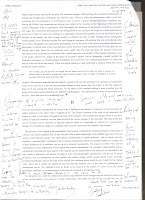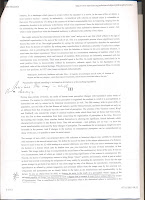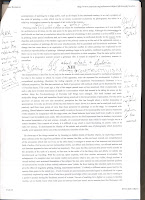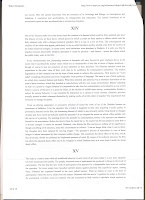Berger.
Doesn't mean that women are vain. Common misunderstanding. Women have an idea of themselves being looked at. Mostly concentrates on nudity in european art. A proliferation of images.
'Vanity'
Mirror is present in the paining as a device that works in harmony with the title. Forces us to make a judgment about this woman- she is vain.
The gaze in the media.
Contemporary advertising.
Woman lost in thought. Assume that she is lost in a moment of vanity. She is not looking at the viewer so it is easier for the viewer to gaze at her- it is easier for us to judge.
Cabanel.
Reclining. Raises hand that covers her eyes, allows us to look at her body without a challenge of her looking back. Three quarters of the image is taken up by her body, the main focus of the painting.
Opium.
Was rejected because of its overt sexual nature.
Emphasis changes with the vertical format onto the face.
Titian
Traditional nude. There is a challenge to the gaze, but her stare is more inviting and relaxed.
Manet.
Modernist period. Modern nude. The difference between the two is that olympia sits elevated and looks directly into the viewers eye. More of an assertive pose. Carries the signs of wealth, receives gifts. Cat represents femininity. Disregarding girft from admirer- looks directly at the viewer.
Ingres.
Guerilla Girls.
Research into quotes.
The Gaze and The Media.
Manet.
Type of self portrait. Manet himself is pictured in the reflection of the bar. Giving the viewer several different perspectives at once. Distorted mirror reflection. Open gesture, represents approachable nature.
Jeff Wall.
Reinterpretation. quote from tate site.
Coward.
Camera extension of the male gaze. People are desensitised by nudity. Although she poses in such a way that invites a gaze, she is wearing sunglasses so as not to challange us. This is a common use within contemporary advertising.
Wonderbra.
Playful interaction that makes the gaze acceptable. Looking down at herself, or looking down on us (in context of a large scale billboard)- inviting, lack of challenge.
Coward.
A form of voyeurism. Look into 'Peeping Tom' 1960.
Men objectified.
Underwear advert ft a male in reclining pose. Similar to birth of venus. Closed eyes. We are invited to look at the body without challenge.
To put this in context. Dr Scott Lucas: "The isuue of male objectivity is often raised in gender classes. Men are now equally objectified in pop culture. Can men be objectified as women are.
Can find examples of male objectivity, however, quantified against the scale of female objectivity it doesn't even compare.
D&G
Different to female- partially clothed. Display of male strength- in a gym setting, sport connotations, health etc. All eyes are staring at the viewer, every single one of them returns the gaze. This gives a sense of power that reflects the setting they are in.
Cinema. 'One may look without being seen."
Find a female protagonist in film.
Gentileschi.
Reverses traditional roles.
Pollock.
Looks at womens exclusion in art history. In history of painting womens role is left out.
Sherman.
Illustrative of the gaze. Wasn't making the work with theories of the gaze in mind. It is existing motifs that appear in photography and film that naturally reflect it.
Lying on a bed. Eyes looking away, reclining body, however, turned vertically much like opium. Gives different connotations. Reminders that we are looking at a reconstruction. Talk about how the replication makes it less sincere and akward- implies acting, so therefore the gaze is not longer enjoyable? What does this mean?
Kruger.
Conscious replication of gaze. Offering us the side of her face as an alternative. Refusal to return the gaze onto her body.
Lucas.
Idea that a woman might be self conscious about eating a banana in public. Visualisation of the idea that a woman creates self consciousness in a fairly mundane everyday act.
Fried eggs.
Her body is there to be consumed. Challenging idea of something derogatory in small breasts.
Emin.
The body creates the money. Bringing together idea of women making money from their art focusing on their bodies.
Sontag.
Powerpoint quote.
Princess Diana.
Our desire to passively consume these voyeuristic images is what feeds their production. Self fulfilling prophecy.
Reality T.V.
Operates in a similar way. Passive consumption of reality. Gives us the power of the gaze? Not reality at all. Aware of their own representation, so therefore change their behaviour as a projection in which they want to be received.
Turning voyeurism into an everyday activity.
"Looking is not indifferent."
Thursday 24 November 2011
Thursday 10 November 2011
Critical positions on the media and popular culture
Known as 'popular culture' and 'mass culture'.
All of these terms are loaded with 'value judgements'.
What is culture?
Raymond Williams: One or two or three of the most complicated words in the English language.
As these processes of general imancipation grow culture exists. Describes a way of living. For example, a sub-culture- certain values, ways of thinking about the world.
Culture can be describing really important works within society. At various points institutions decided that these things are of certain significance, to the point where they can describe culture. For example, Shakespear.
Base:
Culture emerges from the base.
Superstructure:
'Popular Culture'
4 Definitions.
- Well liked by many.
The idea of popular culture quantificly measured- music. The problem with this analysis is that it leads to unreliable results. i.e Shakespear- not classed as popular culture
- Inferior kinds of work
Inferior kind of culture. Mass produced work. Works that aspire to be important and for whatever reasons, fail. A value jusdgement has to be made.
- Work deliberately setting out to win favour with the people.
The tastemakers of culture. Anything that aims to be populist becomes popular culture. Trying to
make something understood by everyone. 'Work that is easy and bored of
people' makes it popular culture
- Culture actually made by the people themselves.
Made by people for the people. I.e. working class popular culture.......EG---->
Work on left is an example of high culture. Left- supposed to make you reflect about the transience of life. Right- supposed to be popular culture. Not supposed to make you contemplate your relationship with the universe. Interesting to ask why??????????? --------> Why wouldn't people ask these questions?
Such judgements and attitudes exist everywhere in life.
E.G. Quality Newspapers, and Popular Newspapers.
Cinema vs Art/ Independent Cinema
The latter is always aimed at the elitist in society. Testament to popular culture as peoples culture- for everyone to speak to everyone.
Look into 'Folk Archive'-interesting.
By the people for the people.
Why is it funny?
They look rubbish...like a poor attempt to create something that looks arty. We feel we could do better than that. We are taght to think a certain way about how art should look and be presented. Where does this institutionalised idea come from?
Created by people who haven't been institutionalised by the elitist thought of the way art should be. Self taught.
What happens when popular culture enters high culture. E.G. Graffiti. What happens when it is translated to mainstream Western culture and is exhibited in galleries? Bought and sold art. Popular culture can start as representing the masses to then move to 'culture'.
Working Class/ proletariat:
'The making of the English working class'.
Condensed together is factories as a mass, and clearly separated from the Bourgeouisie- the owners of the factories.
Bourgeouisie:
Physical distiction between the rich and the poor. Start to create a cultural separation also. Working class start to create their own cultural forms and activities. Own forms of literature and music. Before this moment, the only people in charge of deciding these things were the higher class. Suddenly two opposing voices. Start thinking about how they should be organised, how their society should be run- politicial undercurrents.
CHARTISM- campaign for working class to vote.
Matthew Arnold was the first person who tried to define what culture/ popular culture was.
Disinterested writing- unbias- no hidden agenda. Culture is the force that can minister the diseased spirit of our time. The opposite to clture that is anarchy- this emerging working class culture, that seeks to have it's own voice heard. 'If we teach them how to appreciate our culture we can get them in line'.
Leavis.
'Culture has always been in monority keeping'.
His role to defend culture and its minority keeping.
Harpring back to old times.
Their reading of culture as 'dissmissed' is entirely the opposite. Totally interested and bias.
Form of snobbery. i.e. Eastenders.
Most people talk about popular culture in this way.
Frankfurt School:
What they described as to what was happening in America was the 'Culture industry'. Culture produced in a factory. FORDISM. Equated that process as a process of culture. These 'cultral factories' spew out masses at a time. E.G. People feel like they already understand something about films because they follow certain rules and criteria...it means you know the ending before it had even started. Society wanted these things- MASS CULTURE.
Culture that is spawned out for the masses. The idea of art/culture under capitalism has become mass produced, with all that is created under the guise of culture, with a real undertone of money and profit.
- Bleak.
Depoliticises the working class.
Hollyoaks- sexualising women in education, one dimensional view, propels the view/ mentality that women in education should be sexualised.
Ultimate lesson. Your interest in life, your solution, is to go on these shows and be judged by middle class who tell you that you, plummer/ cashier/ bin man actually have the skills to do well.
Start
to identify our culture by the things that we are surrounded by. If we
are surrounded by this shite then we will be identified by it.
You never end up doing anything about it, just involving yourself with the problems, relating to anything that agrees, or a dream that you want to become a reality- music.
Adorno:
'ON POPULAR MUSIC'.
-all popular music is standardised.
Because everything is standardised and your choice is lateral/ non existent, it acts as a form of 'social cement', to keep you in your place. "Makes you passive and makes you adjust your behaviour in
Relationship between factory and dance music. Slave to the beat. "Mindlessley dance to the' rythm of their own opression"
For Adorno: Culture under capitalism is totaly lost.
Monday 7 November 2011
Mechanical Reproduction / / effect on Art & Design
The Work of Art in the Age of Mechanical Reproduction.
Walter Benjamin (1936)
Main Focus:
AURA / /
AURA / /
'Aura' = authenticity, the line of manipulation / / ownership and the way in which the piece is exhibited. Aura in relation to arts is a negative trait in relation to its bourgeois connections. Reproduction of art by means of photography, and
its distribution to the masses.
"Mechanical reproduction of art changes the reaction of the masses toward art (...) The greater the decrease in the social significance of an art form, the sharper the distinction between criticism and enjoyment by the public"
"Mechanical reproduction of art changes the reaction of the masses toward art (...) The greater the decrease in the social significance of an art form, the sharper the distinction between criticism and enjoyment by the public"
Very interesting essay / / analysis.
Friday 4 November 2011
Thursday 3 November 2011
Marxism & Design Activism
Aims
The philosophers have only interpreted the world, in various ways; the point however, is to change it.
Marx, K. (1845) 'Theses On Feuerbach.
Unification of thought and action- political praxis.
Marxism:
Political manifesto that outlined what was thought as a better way of running society. Describes how labourors, bosses etc, there will always be friction. Also a philosophical method/psycho analysis. Philosophy that is realised thorugh a political revolution- definition of praxis.
Capitalism:
The society that we live in (in the West). It is a society where control of means of production (a few individuals make lots of money and everyone else works for them making them their money) is run by few. Based on individualism. Makes us compete, from the early days of schooling this is forced on you. You are encouraged to try better than everyone else, do better.
...Communist Evolution,
Early stages of society- Primitive Communism- everything was shared, social and sexual freedom.
Accidental heirarchys would emerge:
Slave society-
Feudalism- Aristocracy becomes ruling class. -merchants develop into capitalists.
Capitalism- Ruling class- create and employ real working classes. The workers make the money for the capitalists.
Socialism-
Communism-
Marx Concept of Base/ Superstructure
Base
At any given moment society will have certain tools/technology etc, and people will end up in some kind of production. As an employer/employee/female/black etc. Work around forces of production. Everything is a result of the forces of production.
Superstructure
Everything can be traced back to issues of class/gender politics/ racial politics.
Relations of production, produce various outcomes in society.
Dialectical process. One thing producing its opposite, then the other thing strengthening the initial thing.
Eg. Education.
Base- Bosses and workers. -boss telling worker what to do.
Because we have been told what to do from a small age by someone- i.e, teacher and pupils.
Now in jobs we feel it is acceptable to be told what to do by our bosses, because there has always been that authorative figure in life. -superstructure.
Last sentence of quote on 4th slide?
create a pyramid for current time.
Much more effective to control the way people think, i.e. newspapers/ tabloids etc.
Ideology:
Marxist reading of religion teaches us that if we're good and honourable in life then when you die you wil be rewarded in heaven. Heavy form on mental control.
You can have an ideology, i.e. christianity, political party etc.
or
'False consciousness'. We don't understand the true nature of society and are exploited.
Art as ideology.
Classical art- the only people who were allowed to produce art were the people who could afford lessons, equipment etc. White rich men making art. Kings and Queens buy the art. They decide what is to be created. Very internal. Reflecting the way a certain ruling class thinks.
Art made to train people to think in a certain way. Art has always been ideological.
Society= Economic, Political and Ideological.
Ideology becomes not just propaganda, but a mechanism that controls our lives. Offers reasons for why we are in our situation. e.g.naked women in art- reasons- that's ok because the female figure is more beautiful to draw/ look at. BULL.
Media- Ideological state of apparatus:
Means of production.
All of the media is controlled by few superrich.
Perpetuation of false consciousness.
The Sun:
1997-new labour, the sun controversy.
The times: sophisticated.
Daily star- work on the presumption that working class enjoy big brother and football. They could not like it, however, it is forced upon them. A self fulfilling prophecy.
Student:
anyone that challenges. just a judgement on front page. no mention of political reason.
Subscribe to:
Posts (Atom)








